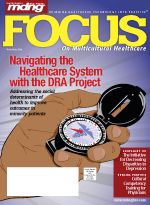Publication
Article
FOCUS Multicultural Healthcare
In it for the Long Haul: Addressing the Social and Economic Determinants of Health Disparities
Author(s):
Projects like the documentary, UNNATURAL CAUSES … is Inequality Making Us Sick? can serve as an excellent starting-off point from which we can collectively begin to address disparities in health and healthcare one person, one family, one organization, and one community at a time.
UNNATURAL CAUSES … is Inequality Making Us Sick? is the title of a powerful documentary that was broadcast nationally in April by PBS. Larry Adelman, executive producer, stated that this film was created “to draw attention to the root causes of health and illness and to help reframe the debate about health in America. Economic and racial inequality are not abstract concepts—they hospitalize and kill even more people than cigarettes. The wages and benefits we’re paid, the neighborhoods we live in, the schools we attend, our access to resources, and even our tax policies are health issues every bit as critical as diet, smoking, and exercise. The unequal distribution of these social conditions—and their health consequences—are not natural or inevitable. They are the result of choices that we as a community, as states, and as a nation have made, and can make differently. Other nations already have, and they live longer, healthier lives as a result.”
I encourage everyone to visit this excellent website, make use of the many valuable resources available there, and network with other interested individuals. Projects like this can serve as an excellent starting-off point from which we can collectively begin to address disparities in health and healthcare one person, one family, one organization, and one community at a time.
In this issue, we profile several other projects that address similar themes as UNNATURAL CAUSES, including the Institute for Alternative Futures’ Disparity Reducing Advances (DRA) Project. This important initiative is addressing the social determinants of health and illness by studying innovative approaches to improving health outcomes in low-income, ethnic, and minority populations. The DRA Project consists of a network of more than 60 public and private sector partners and is currently involved in eight major public health and healthcare projects. These include patient navigator programs in cancer care settings that are designed to increase access to screening, diagnostic, treatment, and follow-up services, as well as provide care coordination and assistance with communication needs, transportation, child care, and financial support. The DRA Project is also involved in the growing use of biomonitoring technologies, such as implanted devices, body-worn sensors, and around-body sensors that can help in identifying risk factors, screening, disease management, facilitating self care, and reinforcing healthy behavior.
This issue also features an article on the Initiative for Decreasing Disparities in Depression (I3D). This was a collaborative CME intervention developed by a partnership involving two academic medical centers and a medical education and communication company, with funding support from Wyeth Pharmaceuticals. It was designed to help physicians improve their ability to detect, diagnose, treat, and manage patients with depression from ethnically, racially, and culturally diverse backgrounds. An innovative participatory process was used to bring together professional and lay experts from a variety of health and mental health disciplines, primary care, quality improvement, and managed care to generate a CME intervention concept/model for addressing disparities and improving depression care for ethnic and racial minorities. I3D was successful in developing several resources, including a core curriculum on current clinical topics in depression, several symposia on depression, a grant-funding process within the context of the larger initiative to support creative approaches to the elimination of disparities in depression at the local level, and a website to centralize and distribute relevant information on the topics of health disparities, depression, and culturally appropriate care. Unfortunately, due to the lack of continued funding, additional educational dissemination activities and outcomes assessments that were planned for future years could not be carried out, underscoring the need for long-term funding for projects.
Finally, in our Special Feature Interview, we hear from Dr. Debbie Salas-Lopez, a general internist and expert in the field of culturally and linguistically appropriate healthcare. She discusses the history of New Jersey’s first-in-the-nation legislation that requires physicians and podiatrists to obtain CME-accredited cultural competency training for their licensure. The subject of required cultural competency training continues to be controversial and is generating many passionate reactions among practitioners.
We look forward to receiving your thoughts and comments about all three of these articles in our efforts to improve the quality of care provided to our increasingly diverse population.
Thank you for reading.
Robert C. Like, MD, MS





